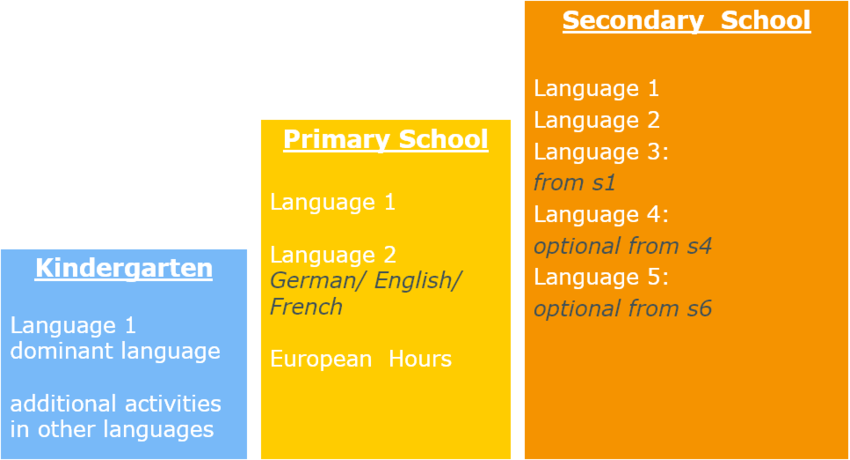Language teaching
All the national languages of the 27 EU countries are taught. Students Without A Language Section (SWALS) follow a specific curriculum. Pupils start studying a first foreign language (L2) in primary year 1. That language may be English, French or German. Pupils start studying a second foreign language (L3) in secondary year 1. Pupils may start studying a third foreign language (L4) in secondary year 4. A fourth foreign language (L5) is a complementary course in secondary years 6 and 7.Latin is taught from year 2 and Ancient Greek is taught from year 4. L3, L4, L5 can, in principle, be any of the official EU languages (except Irish and Maltese).
Use of languages
In years 1-5 of the Secondary School, art, music, ICT and physical education are taught to mixed language groups in one of the three L2 (DE, EN, FR) or in the language of the host country. In years 6-7, art, music (basic and option courses) and physical education are taught to mixed language groups in one of the three vehicular languages (DE, EN, FR) or in the language of the host country. In year 3, human sciences courses and the religion and non-confessional ethics courses are taught in L2 (DE, EN or FR). From year 4, history, geography and economics courses are organised inL2 (DE, EN and FR). The teaching of religion and non-denominational ethics courses in Language 2 (DE, EN or FR) will gradually be introduced in secondary years 4 to 7.
In years 6-7, if the 4-period option course in history and geography cannot be organised in the pupil's vehicular language (DE, EN, FR), the pupil may follow it in another vehicular language provided that this is not the pupil's L1, with the Director's permission. With the approval of the Administrative Board, the school may organise the teaching of certain subjects (e.g. ethics, religion etc.) in the L2 or the language of the host country.
Students Without A Language Section (SWALS)
SWALS are those categories I and II pupils whose mother tongue/dominant language is an official language of an EU Member State (with the exception of Irish and Maltese) but for whom no language section in their mother tongue/dominant language (L1) exists in their school. If one of the language sections of the European Schools corresponding to a category I or II pupil's mother tongue/dominant language is not open in the school, this pupil is entitled to tuition in his/her L1, working on the assumption that the School has at its disposal a duly qualified teacher, or can recruit one.
SWALS are normally enrolled in the English, French or German sections. The language of the section is the pupil's L2. SWALS can also be enrolled in the language section of the host country on condition that no additional costs are incurred. Their L2 should be English, French or German
Educational support
Different forms and levels of support are provided, designed to ensure appropriate help for pupils experiencing difficulties and having special educational needs at any point in their school career, to allow them to develop and progress according to their potential and to be successfully integrated.

